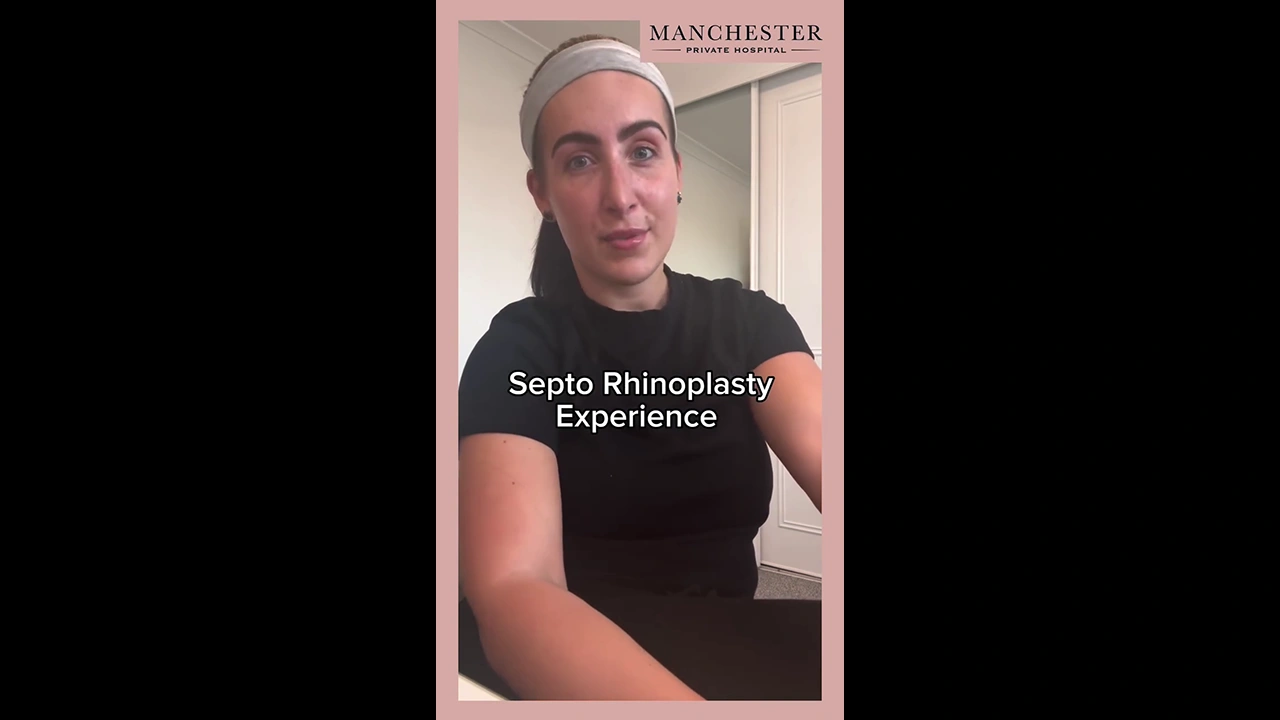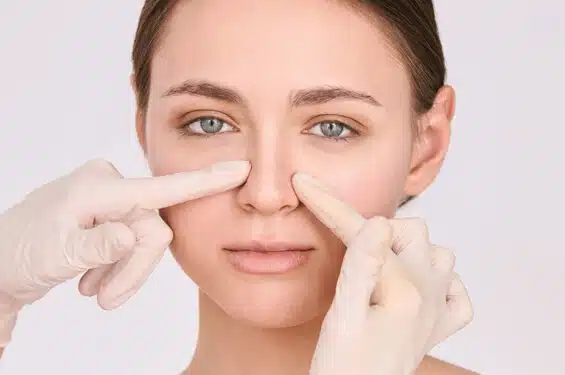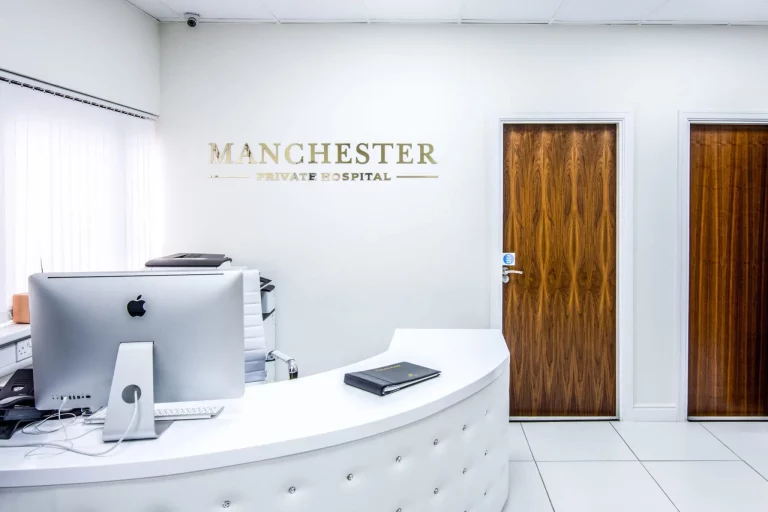Septorhinoplasty
Septorhinoplasty
- Free, no obligation Consultation
- CQC Registered Private Hospital
- Flexible Finance options available
- Top Quality Patient Care

Surgery Time 2 Hours
Results Seen 1-3 Months
Back To Work 1-2 Weeks
Pain Level Moderate
HOSPITAL STAY Day Case
Cost From £8500*
GMC Registered Surgeons
7500+ Happy Patients
Flexible Finance Options
CQC Registered Private Hospital

Deviated septum is a condition when the nose passageways face congestion or are smaller than usual, blocking the free flow of air. This situation occurs when the thin wall in the center of the nose shifts to one side, thereby blocking the air passageways.
Technically, the surgery straightens the crooked septum. The cause of deviated nose may be natural or arise due to accidental damage to the nose.
Many individuals experience the ill effects of a crooked septum, such as persistent dry mouth, snoring, diminished exercise resilience, and reduced quality of life.
A septorhinoplasty treatment is a compelling method for opening the nasal sections by fixing the septum, which should be possible with or without outer changes to the nose. But, a doctor will recommend septorhinoplasty after opting out of other courses of treatments for the patient.
Septoplasty surgery is the best way to address a deviated septum, making breathing through the nose troublesome and resulting in breathing through the mouth. Mouth breathing can cause dry mouth. Powerlessness to inhale through the nose is considered to a greater degree an issue around nighttime and can interfere with sleeping.
Septorhinoplasty is sometimes combined with other surgical treatments, including sinus medical procedures and the expulsion of nasal growths.
At last, it is dependent upon every patient’s tolerance whether to go through septorhinoplasty to fix a deviated septum. The condition won’t hurt any individual who can endure the side effects.
The following are septorhinoplasty procedure steps-
A surgeon mostly performs septorhinoplasty under a general anesthetic. The procedure lasts for a period of 1 to 2 hours.
The septorhinoplasty surgeon will cut the mucosa and lift it off the cartilage and bone. He will eliminate the pieces of the twisted cartilage and bone and return the rest to an upright position.
The specialist can refine the tip of your nose by eliminating a portion of the cartilage. Assuming you have a protrusion or hump (dorsum) on your nose, he will shave it down.
Likewise, he can fix and narrow the nasal bones by breaking and resetting them (infracture).
Your specialist might have to hold or renew some portion of your nose utilizing a cartilage graft, a bone graft, or an artificial implant. He might pack your nose from within to prevent further bleeding and position a brace and strap outside the nose for support.
By and large, you might be a decent candidate for septorhinoplasty if you:
The supports and splints inside the nose remain for half a month, and packing stays for 24 to 36 hours. The doctor may leave some dissolving stitches, which vanish on their own in the long run.
Even though over 90% of septoplasty patients enjoy improved breathing, some don’t. Tragically, the septum has a memory and sometimes gets back to its unique shape.
Since the medical procedure is limited to the nostrils, patients don’t need to stress over facial scars or bruised eyes. Nonetheless, they can encounter pain or tenderness outside the nose. Patients will also experience stuffiness due to expanding and nasal seepage of blood or potentially mucous.
Usually, over-the-counter prescriptions will get the job done for pain, although the specialist might prescribe a pain killer. The specialist may recommend saline sprays to clear the nasal clog.
As the packing is in the nose, the patient should inhale using his mouth until the doctor gets rid of the material.
Septorhinoplasty recovery time may take up to three months, but the swelling usually reduces in two to three days and drainage in two to five days. Some doctors believe that the septorhinoplasty recovery timeline differs from person to person.
Risks or complications are uncommon and far-fetched.
There might be excessive bleeding during medical procedures, particularly in case the patient didn’t quit taking blood-thinning prescriptions ahead of time. Assuming this occurs, the doctor might choose not to proceed with the surgery.
There are chances of infection because the nose insides aren’t sterile. Toxic shock syndrome is a strange and dangerous contamination, identified with packing, which is uncommon. Remember to inform your doctor immediately in case of a change in blood pressure and heart rate, fever, and skin discoloration.
Another uncommon event is spinal liquid spillage. It can happen because the highest point of the septum is close to the skull and cerebrum, which is encircled by defensive cerebrospinal liquid. If spinal fluid breaks, contamination can result. This may prompt meningitis, a severe condition including irritation of membranes around the cerebrum and spinal line.
A septorhinoplasty patient may likewise develop a hematoma, swelling brought about by thickened blood in tissue, or an abscess, a pocket of pus discharge inside the body.
Numbness may occur in the upper teeth and lip or tip of the nose can follow septoplasty. That is because nerves prompting the gums and front teeth in the upper jaw go through the nose. Those nerves may extend or be harmed during a medical procedure. Generally, the numbness is impermanent and stops following a few weeks or months.
Another possibility is a septal perforation, an opening in the nasal septum. Assuming the hole doesn’t indicate symptoms, the doctor will let it be. In any case, in case the spot prompts crusting, dryness, or impediment in the nasal section, the specialist can do one more medical procedure to close the perforation or add a synthetic button over it.
Changes in taste, smell, voice quality, and attributes can influence septoplasty patients. The nose may seem uneven, or the extension of the nose may plunge. However, such surface-level changes can be fixed.
At last, although over 90% of septoplasty patients appreciate improved breathing, some don’t. Tragically, the septum has a “memory” and sometimes gets back to its unique shape.
The advantages of this sort of septorhinoplasty include:
It would be best if you were prepared to discuss your surgery purposes for both appearance and breathing. Ailments, drug allergies, and past clinical treatments. Current prescriptions, nutrients, natural supplements, liquor, tobacco, and medication use.
In planning for septorhinoplasty, you might have to take care of the following:
The surgery usually takes somewhere between one to two and half hours.
You may return to your routine in about 2-4 weeks, depending on the job role and degree of surgery you had.
You can rely on drugs such as nasal steroids, allergy medications. Other than drugs, several alternatives are available, such as nasal strips or nasal humidifiers. You should also try to avoid nasal irritants, if possible.
The cost of septorhinoplasty in the UK ranges from £4,000 to £7,000. Other factors are also considered, such as further surgical procedures, consultations, or follow-up care requirements.
The healing and recovery depend on person to person. It usually takes an average of one year to get accurate results.
All incisions are done inside the nose, so there are no visible scars from the operation.
Manchester Private Hospital have collaborated with Chrysalis Finance to offer 0% finance for our patients.*
1. 0% Interest Free Finance for Septorhinoplasty Surgery (Monthly Payment Plans)
Septorhinoplasty cost: £8500
Deposit amount: £0.00
The amount of loan would be: £8500
Total interest: £0.00
12 monthly instalments of £708.33
The representative APR is 0%
The total amount payable: £8500
2. Septorhinoplasty Surgery Finance Option with Interest (APR 9.9%)
Septorhinoplasty cost: £8500
Total amount of Credit £8,500.
Total charge for credit £2210.60.
Total Amount Repayable £10710.60.
Repayable by 60 monthly payments of £178.51.
Representative 9.9% APR.
*Acceptance is subject to status. Terms and conditions apply.
All our surgeries are tailored to individual patient requirements, and you will receive a fixed price following your consultation with the surgeon during your face to face consultation.
*Procedure prices are not fixed and may vary as procedure costs are tailored to individual requirements so vary from person to person. You will receive a guide price during your initial eConsult and a fixed price following your surgeon face to face consultation.
